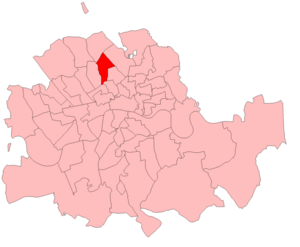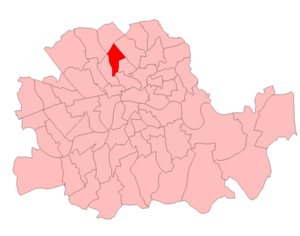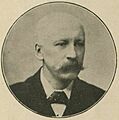Islington West (UK Parliament constituency) facts for kids
Quick facts for kids {{{Name}}}[[{{{Type}}} constituency]] |
|
|---|---|
| [[Image:{{{Map1}}}Constituency.svg|120px|]] [[Image:England{{{Map2}}}.svg|120px|]] |
|
| {{{Name}}} shown within [[{{{Entity}}}]], and {{{Entity}}} shown within England | |
| Created: | {{{Year}}} |
| MP: | {{{MP}}} |
| Party: | {{{Party}}} |
| Type: | House of Commons |
| County: | [[{{{County}}}]] |
| EP constituency: | [[{{{EP}}} (European Parliament constituency)|{{{EP}}}]] |
Islington West was a special area in North London that had its own representative in the Parliament of the United Kingdom. This area was called a "borough constituency."
From 1885, the people of Islington West voted for one person to be their Member of Parliament (MP). This MP would speak for them in the House of Commons. The voting system used was called "first past the post." This means the candidate with the most votes wins, even if they don't get more than half of all votes. This constituency stopped existing for the 1950 general election.
Contents
What Were the Boundaries of Islington West?
A "constituency" is like a voting district. It has clear borders, so everyone knows which MP they can vote for. The boundaries of Islington West changed over time.
From 1918 to 1950, Islington West included two specific areas. These were the Lower Holloway and Thornhill wards within the Metropolitan Borough of Islington.
Who Represented Islington West?
Many different people served as the MP for Islington West. They belonged to various political parties. Here is a list of the MPs who represented this area:
| Election | Member | Party | |
|---|---|---|---|
| 1885 | Richard Chamberlain | Liberal | |
| 1886 | Liberal Unionist | ||
| 1892 | Thomas Lough | Liberal | |
| 1918 | Sir George Elliott | Unionist | |
| 1922 | James Despencer-Robertson | Unionist | |
| 1923 | Frederick Montague | Labour | |
| 1931 | Patrick Donner | Conservative | |
| 1935 | Frederick Montague | Labour | |
| 1947 | Albert Evans | Labour | |
| 1950 | constituency abolished: see Islington South West | ||
Elections in Islington West
People in Islington West voted in many general elections and some special "by-elections." These elections decided who would be their MP.
Early Elections (1880s-1910s)
The first election for Islington West was in 1885. Richard Chamberlain won for the Liberal Party. In 1886, he won again, but this time as a Liberal Unionist.
In 1892, Thomas Lough became the MP for the Liberal Party. He held this seat through several elections, including 1895, 1900, 1906, and both elections in 1910. He was a very popular MP for a long time.
Later Elections (1918-1947)
After World War I, in 1918, Sir George Elliott won the seat for the Unionist Party. The Unionists were closely linked to the Conservative Party.
In 1922, James Despencer-Robertson (Unionist) won the election. However, in 1923, Frederick Montague of the Labour Party won the seat. He held it for several years.
In 1931, Patrick Donner from the Conservative Party won the election. But in 1935, Frederick Montague won the seat back for the Labour Party. He continued to be the MP during World War II.
The last general election for Islington West was in 1945. Frederick Montague won again for Labour. In 1947, a special by-election was held. Albert Evans won this election, also for the Labour Party. He was the final MP for Islington West.
The constituency was officially ended for the 1950 general election. Its area was then included in new constituencies, like Islington South West.
See also
- List of parliamentary constituencies in Islington
Images for kids
 | James Van Der Zee |
 | Alma Thomas |
 | Ellis Wilson |
 | Margaret Taylor-Burroughs |







